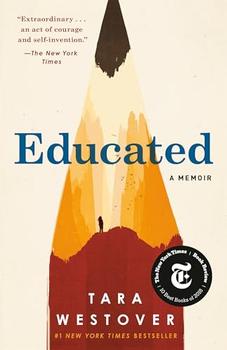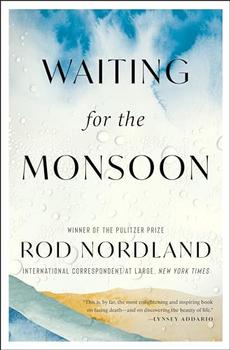Summary | Excerpt | Reading Guide | Reviews | Beyond the book | Read-Alikes | Genres & Themes | Author Bio

A Memoir
by Tara WestoverVoted 2018 Best Nonfiction Award Winner by BookBrowse Subscribers
Tara Westover had the kind of upbringing most of us can only imagine. She was the youngest of seven children raised in Buck Peak, Idaho by Mormon parents who distrusted the federal government and anticipated the end of days. Her father refused to register his children's births, so Westover had no birth certificate or knowledge of her exact birthday. Westover's dad also rejected formal education, so none of his children attended school. They could study at home from a meager selection of textbooks if they chose, but their father valued practical skills more. He put Westover to work in his junkyard, sorting scrap metal when she was merely 10. She also babysat, packed nuts, and worked in a grocery store. But she never went to school.
Few of the simple pleasures of childhood were available. Musical theater provided rare moments of joy in a life of hard labor that included assisting her mother, who was an unofficial midwife and herbalist (see 'Beyond the Book'). The family went through two serious car accidents and her brother Shawn suffered multiple head injuries at his father's construction site. Shawn's behavior grew cruel, especially after his brain damage. He would put Westover's head down the toilet, bend her wrist back until it nearly snapped, and call her a "whore" for wearing lip gloss. This sadistic pattern was repeated with another sister and later, with his wife, yet Westover struggled to convince her parents to believe her and do something, anything, about Shawn's manipulative violence.
Education was Westover's means of escape. Like her brother Tyler before her, she studied independently until she passed the ACT and earned acceptance to Brigham Young University. Here she was forced to wake up to her extreme ignorance. She raised a hand in history class to ask what "the Holocaust" meant, and learned who Martin Luther King, Jr. was. A study abroad year at King's College, Cambridge, opened her mind even more and paved the way for her return to England for Master's and PhD degrees in history. One professor told her she'd written one of the best essays he'd read in 30 years, and referred to her as his "Pygmalion" – a fresh mind that he could mold for success.
From an Idaho junkyard to the venerable halls of Cambridge—it was disorienting for Westover to think of how far she had come and truly believe she deserved to be there. Trips home plunged her back into family turmoil. Her parents disapproved of her pursuing education instead of marriage and motherhood, and her father was severely burned in a fuel tank explosion. He didn't believe in modern medicine, so never went to a hospital; his wife treated him at home with her herbal salves, a booming business that made them wealthy.
Westover's incredible story is about testing the limits of perseverance and sanity. Her father may have been a survivalist, but her psychic survival is the most impressive outcome here. Although this memoir represents Westover's own perspective, she strives to be rational and charitable by questioning her own memory and interpretation of events, often looking for outside confirmation from other family members who witnessed the same events. And though the temptation must have been strong, she doesn't portray her father as a villain; he's more like an Old Testament patriarch, fierce and unmovable. She is careful not to make hers a simple narrative about rejecting Mormonism – in fact, she opens with a disclaimer to that effect – because her parents' extremism was far beyond what is the norm for Mormons.
The writing takes this astonishing life story to the next level, making it a classic to sit alongside memoirs by Alexandra Fuller, Mary Karr and Jeannette Walls. Westover narrates with calm authority, channeling the style of the scriptures and history books that were formative in her upbringing and education. One of my favorite passages reflects on the fundamental differences between her father's viewpoint and her own: "My father and I looked at the temple. He saw God; I saw granite. We looked at each other. He saw a woman damned; I saw an unhinged old man, literally disfigured by his beliefs."
This is one of the most powerful and well-written memoirs I've ever read. In its first half a young girl spends lonely years in the wide-open sanctuary of the American West: "Her classroom was a heap of junk. Her textbooks, slates of scrap," Westover writes. In the second half the whole world and its history open up to her, but at a high price: "having sacrificed my family to my education." The author remains estranged from her parents, and the siblings have formed two factions: four work for her parents' herbal empire in Idaho; three left to pursue education, all obtaining doctoral degrees. Which route would you choose?
![]() This review was originally published in The BookBrowse Review in March 2018, and has been updated for the
December 2018 edition.
Click here to go to this issue.
This review was originally published in The BookBrowse Review in March 2018, and has been updated for the
December 2018 edition.
Click here to go to this issue.

If you liked Educated, try these:

by Tia Levings
Published 2024
"Today it hit me when he hit me, blood shaking in my brain. Maybe there wasn't a savior coming. Maybe it was up to me to save me."

by Rod Nordland
Published 2024
A legendary New York Times war correspondent delivers his unforgettable final dispatch: a deeply moving meditation on life inspired by his sudden battle with terminal brain cancer.




When an old man dies, a library burns to the ground.
Click Here to find out who said this, as well as discovering other famous literary quotes!
Your guide toexceptional books
BookBrowse seeks out and recommends the best in contemporary fiction and nonfiction—books that not only engage and entertain but also deepen our understanding of ourselves and the world around us.